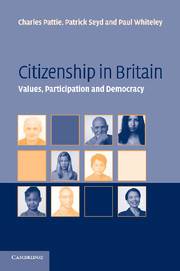Book contents
- Frontmatter
- Contents
- List of Figures
- List of Tables
- Acknowledgements
- Preface
- 1 What is Citizenship?
- I Understanding Citizenship
- II Modelling Citizenship
- III The Consequences of Citizenship
- 7 So What? The Consequences
- 8 The Dynamics of Citizenship
- 9 Challenges to Citizenship in Contemporary Britain
- Appendices
- Bibliography
- Index
7 - So What? The Consequences
Published online by Cambridge University Press: 22 September 2009
- Frontmatter
- Contents
- List of Figures
- List of Tables
- Acknowledgements
- Preface
- 1 What is Citizenship?
- I Understanding Citizenship
- II Modelling Citizenship
- III The Consequences of Citizenship
- 7 So What? The Consequences
- 8 The Dynamics of Citizenship
- 9 Challenges to Citizenship in Contemporary Britain
- Appendices
- Bibliography
- Index
Summary
The preceding chapters have examined the nature of citizenship in modern Britain. The British public are, as we have seen, still active members of their communities, engaged in a wide range of both formal and informal activities. Contrary to the widespread view that citizenship is in crisis (Putnam, 2000), Britain at the start of the twenty-first century still enjoys a civic culture, albeit rather different from that outlined by Almond and Verba (1963) forty years ago.
There is a hidden assumption in all this, however, that citizenship ‘matters’. As well as being assumed to be good in its own right, a strong civic tradition, it is argued, will also be reflected in better lives: better government, more concern for one's fellow citizens, and so on. But is this really the case? In this chapter, we examine variations in citizenship in Great Britain across communities. Do communities with strong local civic cultures fare better than communities where the civic tradition is weaker? Does being good citizens mean we live better lives?
Citizenship and government
Much of the current interest in the putative effects of good citizenship on the quality of life can be traced back to Putnam's (1993) now classic analysis of Italian regional government. The Italian regions were reformed in the early 1970s with the aim of creating relatively powerful, democratically accountable, administratively efficient regional political institutions that would contribute positively to social and economic development in their areas.
- Type
- Chapter
- Information
- Citizenship in BritainValues, Participation and Democracy, pp. 189 - 223Publisher: Cambridge University PressPrint publication year: 2004



